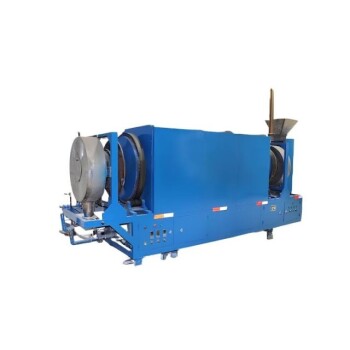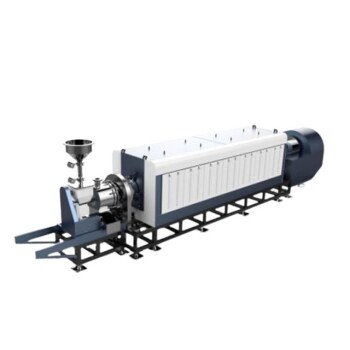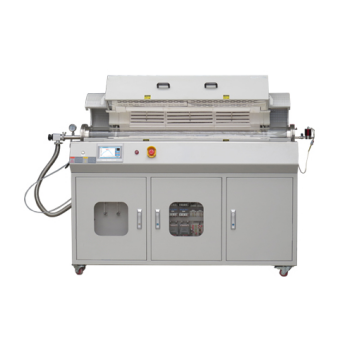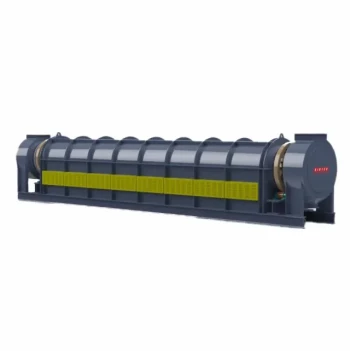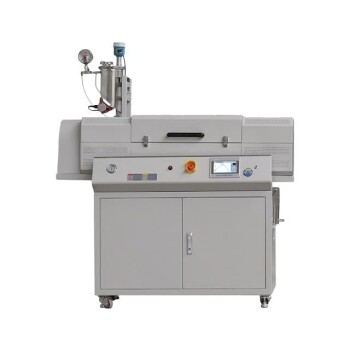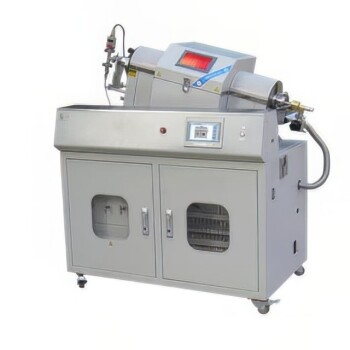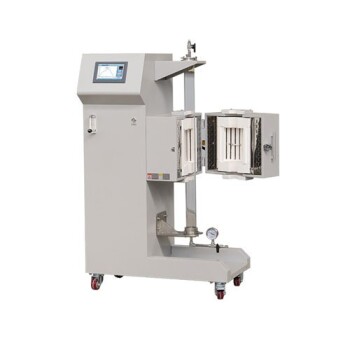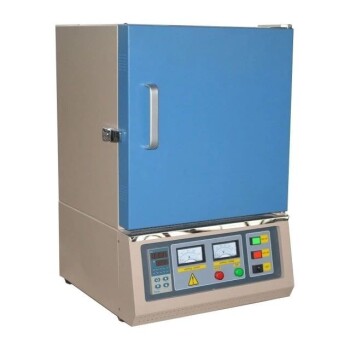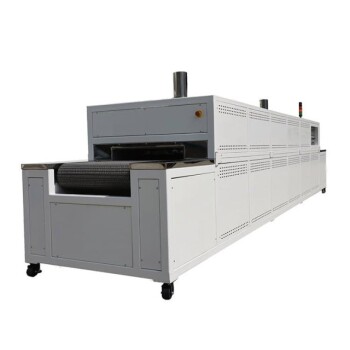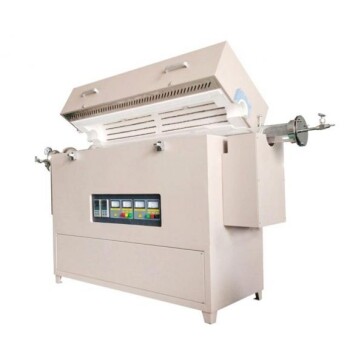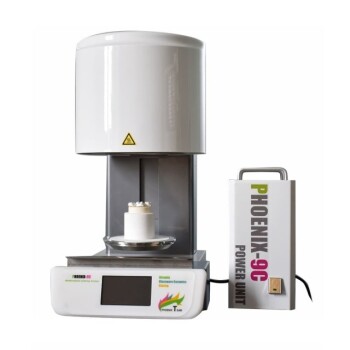At its core, a rotary kiln is an unparalleled solution for continuous, large-scale thermal processing. Its primary advantages are the ability to handle a constant flow of material, ensure a highly uniform and homogenous final product, operate with high thermal efficiency, and offer significant design flexibility for a wide range of materials and industrial applications.
The true value of a rotary kiln lies not just in heating a substance, but in creating a dynamic, precisely controlled environment. Its rotating, inclined design ensures every particle undergoes the exact same treatment, delivering unparalleled consistency at an industrial scale.
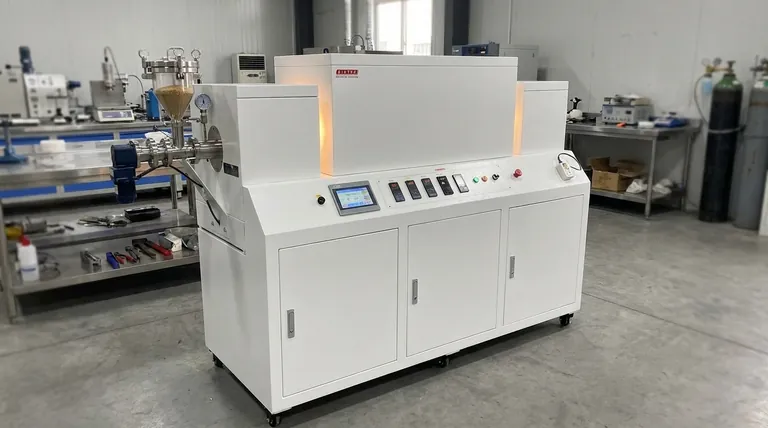
How a Rotary Kiln Delivers Consistent, High-Volume Output
A rotary kiln's distinct design is engineered to solve the core industrial challenges of consistency and throughput. Its operation is based on simple, robust mechanical principles that yield highly reliable results.
The Principle of Continuous Processing
A rotary kiln is a large, rotating cylindrical drum, slightly inclined from the horizontal, typically between 1% and 4%. This slight slope, combined with a slow rotation speed (usually 0.2 to 5 rpm), uses gravity to ensure material continuously moves from the feed end to the discharge end.
This mechanism eliminates the need for batch processing, allowing for a constant, uninterrupted flow of material through the system. This is fundamental to its role in high-volume industries like cement and mineral processing.
Achieving Final Product Homogeneity
As the drum rotates, the material inside is gently tumbled and mixed. This tumbling action is critical.
It ensures that all particles are uniformly exposed to the heat source, eliminating hot spots and preventing inconsistencies in the final product. The result is exceptional product homogeneity, which is difficult to achieve in static furnace designs.
Precision Temperature and Atmosphere Control
The kiln is a sealed system, allowing for precise control over the internal atmosphere. This is crucial for processes requiring specific conditions, such as oxidation or reduction reactions.
Furthermore, the kiln is often divided into distinct heating zones (e.g., drying, preheating, calcining, cooling). This zoning, combined with a burner at the discharge end, allows for a highly accurate temperature profile along the length of the kiln, ensuring the material undergoes the correct changes at the correct time.
The Foundations of Efficiency and Flexibility
Beyond output quality, a rotary kiln's design is inherently efficient and adaptable, making it a cornerstone technology in many sectors.
Superior Thermal Efficiency
Most rotary kilns use a counter-current heat flow. Hot gas from the burner is introduced at the discharge end and flows up toward the feed end, opposite to the direction of the material.
This design maximizes heat transfer, as the hottest gases encounter the most processed material, while the cooler gases encounter the incoming, colder material. The kiln body itself is lined with internal refractory bricks, which insulate the steel shell and minimize heat loss to the environment.
Versatility Across Materials and Processes
Rotary kilns are not a one-size-fits-all solution; they are highly adaptable. Their design can be modified to handle everything from fine powders to coarse granules.
They are used across numerous industries—metallurgy, cement, chemical processing, and waste treatment—for a variety of thermal processes. These include calcination, oxidation, reduction, roasting, and drying, demonstrating their immense flexibility.
Automation and Reduced Labor
Modern rotary kilns feature a high degree of automation. Key parameters like rotation speed, temperature, and material feed rate are managed by control systems.
This automation reduces the need for constant operator intervention, lowering labor requirements and minimizing the potential for human error.
Understanding the Trade-offs and Considerations
While powerful, a rotary kiln is a significant piece of industrial machinery with important design trade-offs to consider.
Direct vs. Indirect Heating
Kilns can be heated directly or indirectly. In a direct-fired kiln, the combustion gases are in direct contact with the material. This is the most common and thermally efficient method. However, it risks contaminating sensitive products with byproducts of combustion.
In an indirectly heated kiln, the drum is heated from the outside. The material never touches the combustion gases, ensuring product purity. This method is less thermally efficient and is typically used for specialized applications where purity is paramount.
Mechanical Complexity and Maintenance
A rotary kiln is a large mechanical system with a drive motor, support bearings or wheels, and seals at both ends.
While built for durability, these components require a regular maintenance schedule to ensure reliability and long service life. The refractory lining inside the kiln will also eventually wear down from thermal stress and abrasion, requiring periodic replacement.
Emission and Dust Control
The tumbling action and gas flow within a kiln can generate significant dust. While the closed system is an advantage for enabling control, it is not a complete solution on its own.
An effective rotary kiln system requires auxiliary equipment, such as cyclones, baghouses, or filtration systems, at the exhaust point to capture particulate matter and control emissions. This is a necessary addition to meet environmental standards.
Is a Rotary Kiln Right for Your Application?
Choosing the right thermal processing technology depends entirely on your primary goal. Use these points to guide your decision.
- If your primary focus is high-volume, continuous production: The rotary kiln's ability to process a constant, uninterrupted material flow makes it the ideal choice over batch-based systems.
- If your primary focus is absolute product uniformity: The continuous mixing action of the rotating drum ensures a level of homogeneity that static furnaces cannot match.
- If your primary focus is product purity for sensitive materials: An indirectly heated rotary kiln is the necessary configuration to prevent any contamination from combustion gases.
- If your primary focus is maximum thermal efficiency for robust materials: A counter-current, directly heated rotary kiln provides the most effective heat transfer and lowest energy consumption per ton of product.
By understanding these core principles and trade-offs, you can confidently determine if a rotary kiln's unique advantages align with your specific industrial processing goals.
Summary Table:
| Advantage | Description |
|---|---|
| Continuous Processing | Enables constant material flow for high-volume output, eliminating batch processing needs. |
| Product Homogeneity | Tumbling action ensures uniform heat exposure and consistent final product quality. |
| Thermal Efficiency | Counter-current heat flow maximizes energy use, reducing operational costs. |
| Design Flexibility | Adaptable for various materials and processes like calcination, oxidation, and drying. |
| Automation | Reduces labor and human error through advanced control systems for reliable operation. |
Ready to enhance your industrial thermal processing with a customized rotary kiln solution? KINTEK leverages exceptional R&D and in-house manufacturing to provide advanced high-temperature furnace solutions, including Rotary Furnaces, tailored for industries like metallurgy, cement, and chemical processing. Our strong deep customization capability ensures we precisely meet your unique requirements for efficiency and consistency. Contact us today to discuss how we can optimize your operations and deliver superior results!
Visual Guide

Related Products
- Vacuum Sealed Continuous Working Rotary Tube Furnace Rotating Tube Furnace
- Electric Rotary Kiln Continuous Working Small Rotary Furnace Kiln for Pyrolysis Plant Heating
- Electric Rotary Kiln Small Rotary Furnace Biomass Pyrolysis Plant Rotating Furnace
- Split Multi Heating Zone Rotary Tube Furnace Rotating Tube Furnace
- Electric Rotary Kiln Pyrolysis Furnace Plant Machine Small Rotary Kiln Calciner
People Also Ask
- What are the key advantages of rotary tube furnaces? Achieve Superior Uniformity and Efficiency for Your Materials
- How does the heating process work in rotary tube furnaces? Achieve Uniform Heat for Powders and Granules
- What other fields utilize rotary tube furnaces? Discover Versatile Heating Solutions for Multiple Industries
- What are some common applications of rotary tube furnaces? Unlock Efficient Bulk Material Processing
- How do rotary tube furnaces contribute to material science and chemical engineering? Unlock Precision in Material Processing

